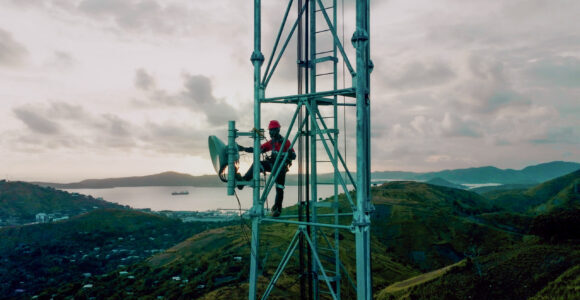PNG DataCo and major mobile operators Vodafone and Digicel have all invested heavily in infrastructure of late. Meanwhile, the question remains whether Starlink will gain entry into the PNG market in 2025.

A new Vodafone tower seen over Port Moresby. Credit: Vodafone PNG
More than 12,000 km of fibre-optic cables have been built as part of PNG’s broadband network, the National Transmission Network, which the state-owned telecommunications wholesaler PNG DataCo owns and manages.
But while around 80 per cent of the population is now covered by broadband connectivity, the rate of mobile penetration is still only 30 to 40 per cent, according to the latest estimates from the National ICT Authority (NICTA).
Fixed-line services are no longer the mode of communication right now in the country.
PNG DataCo is aiming to bridge the connection gap with the construction of 500 mobile carrier-neutral towers by 2026.
This is part of a budgeted K592 million spend on digital infrastructure over a three-year period, which also includes the commissioning of phase two of the Kumul Submarine Cable Network, KCSN-2.
“We’re filling in the gaps where the current mobile carriers can’t go because of economic reasons,” Tony Morisause, PNG DataCo’s General Manager Engineering, told the 2024 Business Advantage PNG Investment Conference.
Stimulating growth
PNG’s mobile operators have made substantial investments in infrastructure, with Digicel PNG building 115 towers and upgrading 96 towers to 4G LTE since its acquisition by Australia’s Telstra in 2022, and Vodafone PNG building 800 towers since it entered the market in 2022.
Tarik Boudiaf, Chief Executive of Digicel PNG, says his firm has seen positive year-on-year growth, mainly driven by the new sites it has deployed.
But in spite of the significant progress being made, Boudiaf tells Business Advantage PNG that “the telco industry is not moving at the level expected.”
“We have dependencies mainly on connectivity, which is related to the availability of power and data coverage.”
Pradeep Lal, CEO of Vodafone PNG, says his company’s focus is on optimising its network to provide the best experience to its customers.
“We are also collaborating with DataCo to build network redundancies,” Lal tells Business Advantage PNG.
“There were a few bottlenecks here and there. As business partners [with PNG DataCo], we have strategically worked together to help fix that.”
Demand for services
The expansion of connectivity is creating more corporate demand for IT services, sources tell Business Advantage PNG.
Russell Tato, Acting CEO of Datec PNG, a subsidiary of state-owned Telikom PNG, says businesses have asked Datec for better ways to deliver the internet.
“Fixed-line services are no longer the mode of communication right now in the country. A lot more bandwidth is therefore going to be needed,” he says.
Meanwhile, Remington Group is investing in internet services through the acquisition of new subsidiary, OFC.
“The long term plan is to have our own data warehouse,” says CEO Navin Raju.
Preparing for Starlink
Looking ahead, attention will centre on the bid by global satellite internet provider Starlink to enter the Papua New Guinea market, which is already in other Pacific markets such as Fiji.
Satellite connectivity is already part of the technology mix in PNG. In late 2023, NICTA agreed in principle to issue licences to Starlink, but this process has been blocked since February 2024 by judicial review proceedings in the National Court.
Russell Tato says he is confident Starlink will “do wonders” for the country.
“The quicker that we get Starlink into the market, the better for PNG businesses. Starlink will add to the connectivity in the country. As more people go online… traffic will run back to the PNG DataCo fibre cable.”
A version of this article was first published in the 2025 annual edition of Business Advantage Papua New Guinea, published in March.








Speak Your Mind